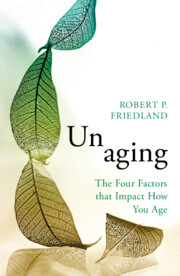Book contents
- Unaging
- Reviews
- Unaging
- Copyright page
- Dedication
- Contents
- List of Figures and Tables
- Preface
- Part I Foundations: What Do We Need to Know about Optimal Aging?
- 1 Aging Is Not Inevitable, It Is an Opportunity
- 2 The Theory of the Multiple Reserve Factors
- 3 The Brain Is Not an Organ, It Is the Master
- 4 Memory and Cognition
- 5 The Neurodegenerative Diseases of Aging
- 6 Stroke and Vascular Cognitive Impairment
- 7 Other Dementias
- 8 Our Microbiota and How to Do Gene Therapy in the Kitchen
- 9 The Health of the Body and the Physical Reserve Factor
- 10 Depression, Anxiety, and What Good Is Feeling Bad?
- 11 Genetics Aren’t Everything
- Part II Applications: What Can We Do about the Opportunity of Aging?
- Part III Conclusions
- Acknowledgments
- Glossary
- References
- Index
6 - Stroke and Vascular Cognitive Impairment
from Part I - Foundations: What Do We Need to Know about Optimal Aging?
Published online by Cambridge University Press: 15 September 2022
- Unaging
- Reviews
- Unaging
- Copyright page
- Dedication
- Contents
- List of Figures and Tables
- Preface
- Part I Foundations: What Do We Need to Know about Optimal Aging?
- 1 Aging Is Not Inevitable, It Is an Opportunity
- 2 The Theory of the Multiple Reserve Factors
- 3 The Brain Is Not an Organ, It Is the Master
- 4 Memory and Cognition
- 5 The Neurodegenerative Diseases of Aging
- 6 Stroke and Vascular Cognitive Impairment
- 7 Other Dementias
- 8 Our Microbiota and How to Do Gene Therapy in the Kitchen
- 9 The Health of the Body and the Physical Reserve Factor
- 10 Depression, Anxiety, and What Good Is Feeling Bad?
- 11 Genetics Aren’t Everything
- Part II Applications: What Can We Do about the Opportunity of Aging?
- Part III Conclusions
- Acknowledgments
- Glossary
- References
- Index
Summary
Stroke is the leading cause of disability worldwide and the second leading cause of death. Large and small strokes and disease of small cerebral blood vessels can lead to dementia, as well as milder degrees of cognitive deficit (vascular cognitive impairment). Strokes may be large or small and may occur with or without bleeding in the brain. The brain can also be damaged by a long-term lack of sufficient blood flow with loss of the axons, needed for neurons to communicate with each other. Attention to the four reserve factors (cognitive, physical, psychological, and social) can help to prevent stroke as well as improve recovery and diminish the effect of stroke on cognitive function. Cerebrovascular disease makes a very important contribution to cognitive impairment with aging. Recent studies have demonstrated several ways in which bacteria that reside in the mouth are involved in causing strokes. There are many modifiable risk factors for stroke including a high-fat diet, obesity, smoking, poor oral hygiene, physical inactivity, atrial fibrillation, alcoholism. Lifestyle factors play a large role in the risk of all forms of stroke
Keywords
- Type
- Chapter
- Information
- UnagingThe Four Factors that Impact How You Age, pp. 107 - 116Publisher: Cambridge University PressPrint publication year: 2022



